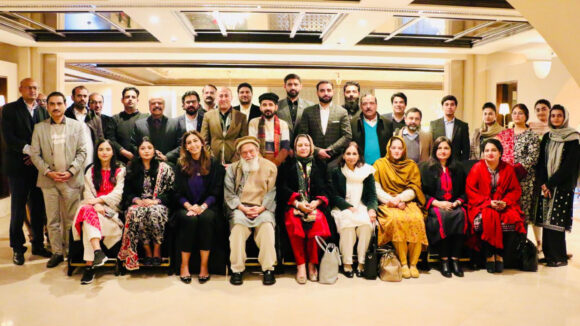UNS, Lahore: Pakistan’s rapidly growing environmental degradation can be managed through climate-resilient Water Sanitation and Hygiene (WASH) interventions, experts emphasized at a policy dialogue in Lahore. The event, organized by WaterAid in collaboration with the Sustainable Development Policy Institute (SDPI), marked the launch of a policy brief titled “Climate-Resilient WASH: A Pathway to Achieving Sustainable Development Goals”.
The experts underscored the need to align climate-resilient WASH interventions with the Sustainable Development Goals (SDGs) to achieve sustainable development and economic prosperity. Pakistan aims to join the League of upper-middle-income countries by 2030, and climate-resilient WASH is critical to achieving this goal.
Dr. Shakeel Hayat, Senior Advisor, Climate Change and WASH, WaterAid, highlighted the importance of access to WASH for health and sustainable development, especially in regions vulnerable to climate change, pandemics, and conflicts. “Millions of people lack access to safe water, sanitation, and hygiene facilities, leading to significant health and economic challenges,” he stated.
The policy brief emphasizes the need for investments in climate-resilient WASH infrastructure, public-private partnerships, and gender-sensitive services to improve health outcomes and foster economic growth. It also highlights the importance of aligning national policies with global sustainable development objectives.
Experts and policymakers called for immediate action to integrate climate resilience into WASH systems. “The pathway to achieving sustainable development lies in integrating climate resilience into WASH systems,” said Mr. Muhammad Sufyan, Provincial Manager of WaterAid for Punjab and KP. “We need to focus on actionable strategies that mitigate the impacts of climate change and foster sustainable growth and community well-being.”
The government was urged to take measures to ensure the implementation of climate-resilient WASH interventions. This includes developing and implementing policies and programs that promote climate-resilient WASH, increasing investments in climate-resilient WASH infrastructure, and promoting public-private partnerships and gender-sensitive services.
The experts also emphasized the importance of community involvement and participation in WASH programs. “University students can be utilized as ambassadors of WASH in their regions,” said Dr. Uzma Ashiq, Incharge Gender and Development Studies Department, Lahore College Women University.
In conclusion, the policy dialogue emphasized the urgent need for climate-resilient WASH interventions to achieve sustainable development and economic prosperity in Pakistan. The government, policymakers, and stakeholders must work together to ensure the implementation of climate-resilient WASH interventions and promote sustainable development in the country.




